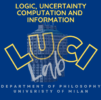Prof. Sanjay Modgil, Reader in Artificial Intelligence at the Department of Informatics at King’s College London and visiting Professor at the Department of Philosophy at the University of Milan, will teach a course entitled Truth, Logic and Dialogue, on February 27 (room 515, at 10:30) and on February 28 (room S. Antonio I, at 10:30) at the Department of Philosophy (University of Milan).
Anyone who is interested is welcome to join!
Truth, Logic and Dialogue: Over the course of two lectures I will develop an account of truth as a norm and the implications that this conception of truth has for the study of non-monotonic logic and its uses in Artificial Intelligence.
Lecture 1: I briefly review the main philosophical approaches to truth, by way of then developing an approach inspired by the work of the American pragmatist and logician Charles S. Peirce. Specifically, I suggest that truth amounts to a normative injunction to inquire, so as to resolve uncertainty, in view of the instrumental utility that accrues from resolving uncertainty. Inquiry is to be understood in a broad sense, as norm governed inferential processes that are inherently dialectical, and that offer prescriptions for individual agent reasoning and multiple agents engaged in collaborative, distributed reasoning. Moreover, I suggest that the truth norm’s injunction to engage in dialectical inquiry, is constitutive of recent predictive processing models of cognition. These essentially Bayesian models provide a unifying account of perception and action. They describe the brain’s main function as effectively resolving uncertainty by seeking to minimise the `errors’ that arise when brain-generated predictions as to the sense data it expects at any given moment, conflict with incoming sense data. Finally, I argue that the conception of truth as a norm, preserves many of the intuitions underlying rival approaches to truth, or at least those intuitions that make a difference to our individual and social practices.
Lecture 2: I suggest that we look to the study of non-monotonic logics, when articulating the inferential norms that govern these processes of dialectical inquiry. There is a growing body of research that aims at formalising individual agent non-monotonic reasoning in terms of the dialectical exchange of arguments. Given the above account of inquiry broadly construed, we are then faced with two challenges. Firstly, integration of these dialectical formalisations of non-monotonic logics with probabilistic (in particular Bayesian) inference; one that is suited to modelling predictive processing account of cognition. Secondly, reformulating these dialectical characterisations of individual agent non-monotonic reasoning in terms of normative constraints on speech acts, so as to obtain communicative accounts of distributed non-monotonic reasoning. I focus on progress towards meeting this second challenge (in particular, I point to ongoing work with Marcello D’Agostino), and argue for the importance of this ‘dialogical turn’ given some of the ethical challenges raised by contemporary developments in Artificial Intelligence.
Sanjay Modgil is a Reader in Artificial Intelligence at the Department of Informatics at King’s College London, and a visiting Professor at the Department of Philosophy at the University of Milan. His research and teaching focus is in the areas of ethics and the philosophy of Artificial Intelligence (AI), formal logic, and models of dialogue to enable humans and AI systems to communicate and reason together. See https://nms.kcl.ac.uk/sanjay.modgil/ for more details of his work and activities.
